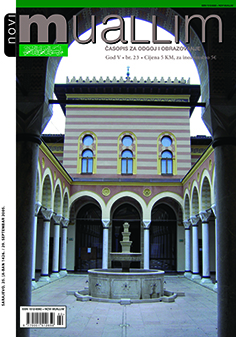SOCIAL, EMOTIONAL AND DIDACTIC FACTORS IN TALENT DEVELOPMENT
DOI:
https://doi.org/10.26340/muallim.v6i23.1177Abstract
There is no one integrated theory about recognizing and developing talent. The definition of talent has evolved, from intelligence coefficients (IQ), as the only valid indicator of talent, to many other kinds of intelligence and capabilities. The biggest role is given to the environment as a factor, which forms and even creates a talented individual. However, the role of a child in its own development is not properly understood and is unjustifiably neglected. Many gifted children do not have academic, but rather social and emotional problems, which prevent them from fully using their potentials. In order to enable talented students to develop emotionally and socially, the curriculum must take into consideration the following seven factors: awareness and understanding of oneself, understanding of others, interpersonal experiences, group processes and interactions, creativity, relaxation and visual imagination and, finally, problems associated with being gifted. In order to satisfy the social and emotional needs of the talented, it is necessary to organize various forms of cooperation between professors and parents. Capabilities of gifted children vary greatly. In order to maintain and develop their above-average capabilities they need special attention. Characteristics and styles of learning of the gifted children differ greatly from those of the other children. The professors should be familiar with these characteristics and styles so to be able to behave appropriately in certain situations. The talented adopt new things faster than the average students. They recall past experiences and knowledge in order to better understand the new things. Also, they can adopt much more abstract and complex ideas and concepts than the average children can. Only the individual attention to their educational, emotional and social needs leads to their full above-average development.
Downloads
Published
How to Cite
Issue
Section
License
Naknada:
a. Časopis ne naplaćuje naknadu za obradu članaka (APC) i naknadu za podnošenje članaka.
Autori koji objavljuju u ovom časopisu pristaju na sljedeće uvijete:
- Autori zadržavaju autorska prava i pružaju časopisu pravo prvog objavljivanja, pri čemu će rad jednu godinu po objavljivanju biti podložan licenci Creative Commons imenovanje koja omogućuje drugima da dijele rad uz uvijet navođenja autorstva i izvornog objavljivanja u ovom časopisu.
- Autori mogu izraditi zasebne, ugovorne aranžmane za ne-ekskluzivnu distribuciju rada objavljenog u časopisu (npr. postavljanje u institucionalni repozitorij ili objavljivanje u knjizi), uz navođenje da je rad izvorno objavljen u ovom časopisu.


